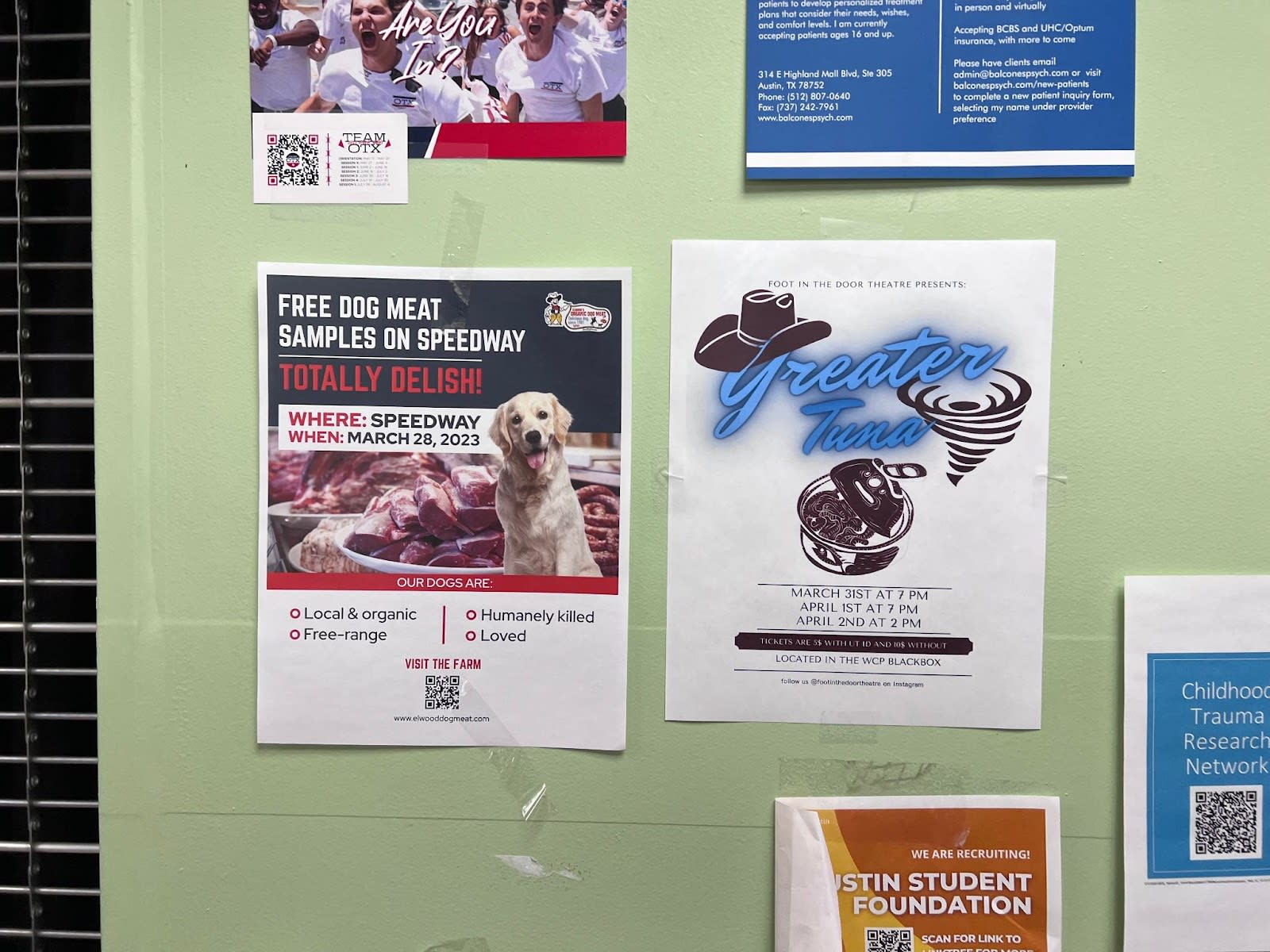Is Stirring up Anger Good for Vegan Outreach?
At Allied Scholars, we’ve experimented with different vegan outreach tactics on college campuses. One of the most effective – and entertaining! – strategies we’ve tried has been giving out samples of “dog meat.”
Elwood’s Organic Dog Meat
Molly Elwood started marketing Elwood’s Organic Dog Meat to drive online engagement with arguments for veganism. Over 3 million unique visitors have visited the website.

In general, people love dogs and often form strong emotional relationships with them.
Pointing out that pigs are just as intelligent as dogs is a classic vegan argument, because no one wants to think about their own pet being hurt.
When we market Elwood’s Organic Dog Meat, non-vegans tell us all the usual reasons to go vegan: “Dogs feel pain! Dogs don’t want to die! It’s not necessary; we can eat other foods!”
We Got Yelled at But…
We find that a dog meat stand draws a lot of attention and is a very effective way to initiate meaningful conversations about the ethics of animal consumption. We also put up flyers around campus inviting folks to join us for samples!

It generated coverage in the UT Austin student newspaper and a post on reddit.
In an extreme case, one man literally yelled at us in anger and then completely changed his mind on animal consumption right in front of us. You’ve got to watch this short video up to the end!
Obviously this is just one anecdote, and anger can be a double-edged sword if used to dominate the other rather than as a messenger for change.
Nonetheless, it is possible to get this right, and we don’t think there is anything manipulative or dishonest about emotion-laden intuition pumps.
Anger Has a Purpose
Emotion plays an important role in human moral intuitions, and when a society’s moral intuitions are systematically wrong on an important issue, we should expect that appeals to emotion will be needed to drive the necessary changes.
It would be nice if simply laying out a rational case for moral circle expansion were enough to convince everyone to go vegan. Unfortunately, this is not how humans work.
For most people, intellectual conviction is a necessary but not sufficient condition for a major lifestyle change like veganism. In order to actually commit to going vegan and avoid recidivism, most people need to viscerally feel the importance of it.
In other words, rational argument only goes so far. Running into a “dog meat” stand on the street can trigger a much more visceral reaction than any philosophical thought experiment.

Needless to say, we don’t actually give people dog meat. We advertise the meat to draw passerby into a conversation, and eventually tell them that it’s not real. If you want to try this yourself, we recommend using Beyond or Impossible meat, though you can also just not give them anything.
If you hand out food, it’s important to ask people whether they have any food allergies before they eat what they believe to be dog meat. Perhaps have them sign a waiver if you’re worried about liability.
From Anger to Dialogue
Leadership experts talk about “crucible moments,” or times of emotional uncertainty and intensity that inspire personal growth and development. We think this may be a useful way to frame vegan outreach.
If we are serious about getting the public to start taking animal welfare seriously, it will be necessary to – gently and compassionately – push people out of their ideological comfort zones.
Not everyone wants to question their own beliefs.
So a “dog meat” stand is a great way to provoke curiosity and get people interested in having a meaningful dialogue, which reveals the truth in their beliefs.
We’re planning to do more “dog meat” stands in the future and to experiment with other related tactics.
Love it or hate it? Let us know!
Do you think any people were really turned off by this? This would be my concern. That people would get really annoyed by this as an unfair mockery of the meat eating position. Do you think this happens?
I’m all for experimenting with strategies for vegan outreach! Do you know of any RCTs that actually test the behavioral effects (i.e. eating meat or not) of interventions like this? I was thinking of doing a little lit review to show just how little we know about what moves the needle here
Yeah!
Faunalytics did an RCT comparing showing people 2D factory farming footage to 3D VR. They found that both led to lower pork consumption than the control group, and that the VR was not a meaningful improvement over 2D screens.
Another Faunalytics study compared students’ self-reported willingness to reduce consumption after viewing different videos.
The Humane League did RCTs on showing people a documentary on health, environment, & animal welfare reasons for veganism and did not find a significant effect on meat consumption. Notably, in the conclusion the authors say that “Novel intervention strategies may be needed to meaningfully shift dietary consumption away from meat and animal products.”
On the other hand, THL also published a meta-analysis with encouraging implications for interventions that focus on animal welfare-related messaging.
THL lists a few other relevant studies here that I haven’t looked at. There were also the leafletting studies by ACE and Faunalytics, both of which found leafletting to be ineffective.
With a lot of these studies, reliance on self report means that there are problems like social desirability bias.
I’ve also been thinking of writing up some kind of review, feel free to DM me if you want to collaborate :)
Thank you! Self-reported is better than nothing but worse than, eg, collecting grocery bills or monitoring consumption in a common space like a dorm-specific cafeteria. Ideal implementation partner for this kind of study is meal kit or grocery delivery company. Will take a closer look shortly
I’m curious: How many people actually tried or wanted to try out the dog meat?
Also for passer-by’s perhaps having large QR codes that lead to Elwood’s website is handy.
Thanks, I like the QR code idea!
I’m not sure about exact numbers but I’d estimate ~30% seemed genuinely interested in trying dog meat
Wow! Not sure what to conclude from that.
Thanks for posting this, I have a few questions.
Do you have any other metrics besides visiting the website? Is there a link such as “learn more about veganism” that you can track?
Besides anecdotes, do you have evidence/data that the “dog meat” intervention works better than other interventions?
I do worry that while shock value may work for some people, it could push other people further away from veganism (especially if they felt deceived). But, I am unsure how serious (or important) this concern is.